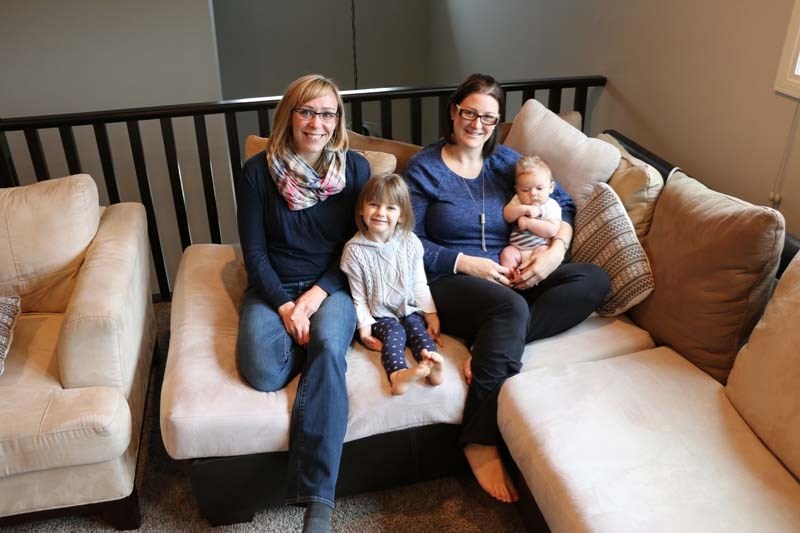There are few parents who can’t relate to sleepless nights and running on an empty tank.
From the moment of revelation that a bundle of joy is on its way, pregnant mothers optimistically smile their way through comments and jokes about how sleepless nights and midnight feedings will soon make sleep-in Saturdays and eight hour stretches seem like a distant memory.
What Melanie Pinet, a practising nurse, registered International Board Certified Lactation Consultant and recently certified pediatric sleep consultant practising in Cochrane, wants all new moms to know is that it doesn’t have to be this way.
Inspired by her work as a pediatric nurse, Pinet became a lactation consultant six years ago, living and working in Canmore.
Following her and her family’s move to Cochrane three years ago, she opened up her lactation consultant business, Love n’ Snuggles, one year ago.
Following her own personal challenges with sleep as a mother of twin girls (now eight) and a son (now five) who “did not sleep,” Pinet learned firsthand the benefit in seeking out a professional.
“I hired a sleep consultant and my son was sleeping through the night within three nights,” she remarked.
While Cochrane moms have kept her hopping as a lactation consultant, she was quickly able to gauge that there was a void with respect to helping babies become better sleepers.
“I would get a lot of questions about sleep but I didn’t feel educated enough in just my LC role,” she explained.
“My plan was to launch this side of my business in January – but I couldn’t wait that long.”
Pinet took her certification through the Sleep, Baby, Sleep program, designed by registered nurse and certified baby and toddler sleep consultant Violet Giannone from Connecticut; she selected this program over others for its multi-method approach.
“Parents have been told from the beginning that when baby wakes up they have to wake up too,” said Giannone.
“You don’t have to be that sleep deprived … there are things you can start doing from a very early age to help baby sleep better, sooner.”
Like Pinet, Giannone became motivated to enter the field following her own experience as a new mother (she now has two young daughters) suffering sleepless nights with an infant awake every one to two hours.
“I knew there had to be a better way,” she said.
This led Giannone to pour countless research hours, supported by her nursing degree and experience, to help shape the Sleep, Baby, Sleep certification program.
The program is an approved training provider for the International Institute for Complementary Practitioners.
Giannone is a professional member of the National Sleep Foundation; a regional representative for the International Association of Child Sleep Consultants; and a registered nurse in the State of Connecticut.
Natalie Amies, a Cochrane mother of two – nine week old son Gavin and three and a half year old daughter Quinn – contracted Pinet’s services recentl. Amies said the expansion of Love n’ Snuggles into helping families sleep will fill a major void in the mommy community.
“More so now than ever I feel like people are dependent on getting that good night’s sleep,” said Amies, referring to the fast-paced lifestyle of the modern family, as well as how the economic downturn has resulted in many families performing a juggling act of double shifts and second jobs.
According to the general guidelines on the Canadian Pediatric Society’s website, newborns (0-2 months) need around 16 to 18 hours of sleep per day (three to four hours at a time); babies two to six months need around 14 to 16 hours; 14 hours for babies six to 12 months; 10 to 13 hours for toddlers one to three years of age; 10-12 hours for preschoolers three to five years, as well as kids five to 10 years.
The website reiterates what Pinet and Giannone emphasize: that poor sleep habits are correlated with behaviour issues such as fussiness and crankiness, poor eating and overall health.
“Babies love routines and they like knowing what comes next,” explained Pinet, adding that parents will often fall into the cycle of doing “whatever they can to get babies to sleep.”
According to Pinet, babies sleep in cycles of 30 to 90 minutes and it’s when they can’t get back to sleep that they wake up and cry.
The first couple of months are likely the most challenging, as babies don’t start producing melatonin (the natural human sleep aid) until three months of age.
Few babies, however, need to nurse in the middle of the night (once they have reached that three to four months mark) so incorporating simple routines rather than nursing often proves beneficial, such as using repeat phrases and staying quietly in the room while baby self soothes in the crib.
Pinet also noted that identifying when props (lights, toys, bottles, parents) lead to dependencies is key and to be self-aware as parents to be observers of baby’s behaviour.
She also works with families on such hurdles as sleep regression (most common at four, nine and 12 months); teething; and transitioning babies from crib to bed.
Lactation and sleep consulting services are private and not currently covered by Alberta Health, but may be covered by benefit service providers.




